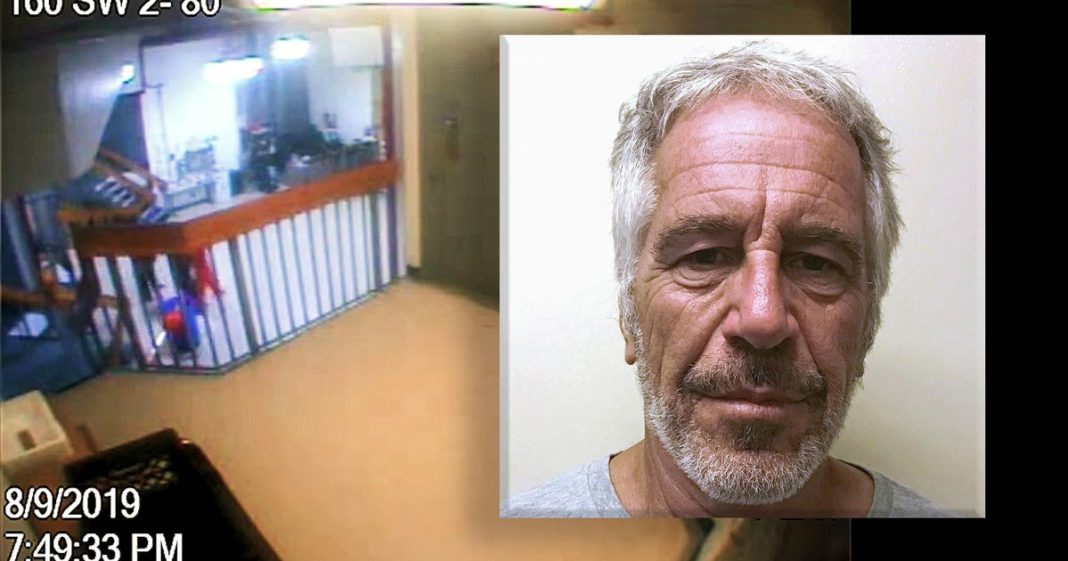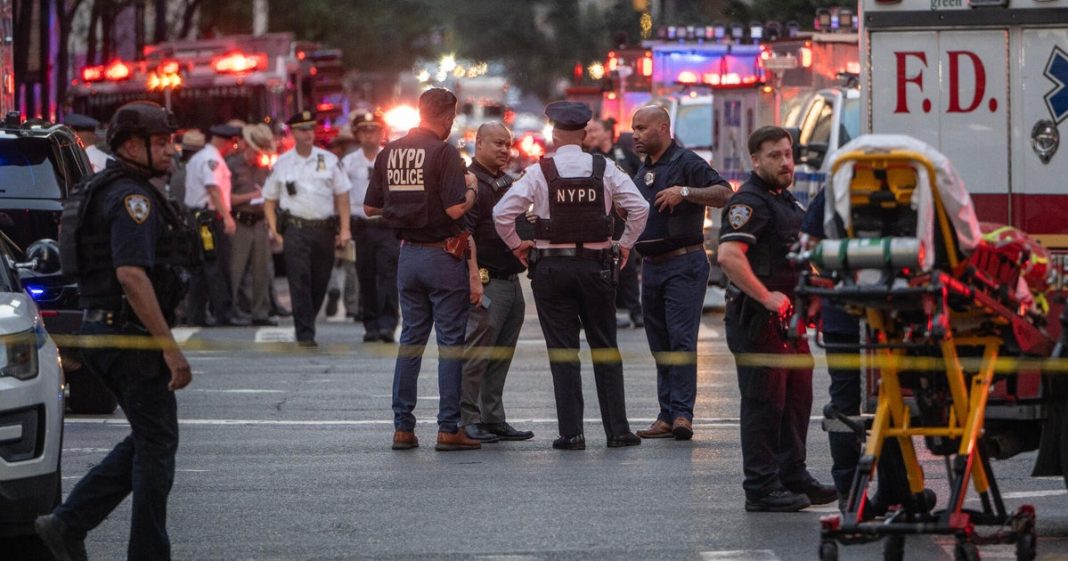




In the weeks after Jeffrey Epstein died at the Metropolitan Correctional Center in lower Manhattan, in August 2019, then-Attorney General William Barr said his “personal review” of surveillance footage clearly showed that no one entered the area where Epstein was housed, leading him to agree with the conclusion of the medical examiner that Epstein had died by suicide.
It’s a claim that’s been repeated by other top federal officials, including FBI Deputy Director Dan Bongino, who said on Fox News’ “Fox and Friends” in May, “There’s video clear as day — he’s the only person in there and the only person coming out.”
But a CBS News analysis of the raw video the FBI made public earlier this month reveals that the recording doesn’t provide a clear view of the entrance to Epstein’s cell block — one of several contradictions between officials’ descriptions of the video and the video itself.
CBS News also digitally reconstructed the Special Housing Unit, or SHU, where Epstein was held, using diagrams and descriptions from the 2023 report on Epstein released by the Justice Department inspector general. The CBS News review found the video does little to provide evidence to support claims that were later made by federal officials. Additionally, CBS News has identified multiple inconsistencies between that report and the video that raise serious questions about the accuracy of witness statements and the thoroughness of the government’s investigation.
The review doesn’t refute the conclusion that Epstein died by suicide. But it raises questions about the strength and credibility of the government’s investigation, which appears to have drawn conclusions from the video that are not readily observable.
The Epstein jail video
The silent surveillance video, which runs for 11 hours, provides a narrow window into Epstein’s world during his last hours on earth. Staffers on duty that night in the Metropolitan Correctional Center carry blankets, fill out paperwork and occasionally appear to doze off.
The grainy, pixelated footage shows two doors, a nondescript blue trash can and a stair landing. Beyond the banister, a third of the frame is filled with a bright, fluorescent-lit open area. A staircase is visible on the left, and in the back, a dark, blurry patch marks the correctional officer’s desk. To the right of the desk is the faint outline of part of the staircase leading up to Epstein’s cell.
Several cameras in the Special Housing Unit were functioning but unmonitored, the report said, and the government has stated that a failure of the digital video recording system resulted in the loss of most of the footage from the night of Aug. 9-10, 2019, that would have provided a fuller view.
The video that was released begins at 7:40 p.m. Nine minutes later, according to the report of the Justice Department inspector general, Epstein appears for the first and last time on camera. He emerges from the left side of the screen and walks down a stairwell accompanied by a corrections officer. Employees told investigators that Epstein had just finished an unmonitored call, later reported to have been with his girlfriend in Belarus.
The video rolls, almost uninterrupted, for the next 11 hours. At 6:30 a.m., corrections officers can be seen rushing across the frame. The Justice Department later disclosed that that’s when Epstein’s body was discovered.
Over the course of the night, the staff on duty failed to conduct the required 30-minute check-ins on Epstein while he spent the night alone in his cell.
Prison officials had already determined that he was a suicide risk — he had allegedly tried to kill himself weeks earlier, in mid-July. Because of this, under prison protocol, he was assigned a roommate. But that roommate had been transferred earlier in the day and prison staff had not assigned him a new one.
Two staff members, Tova Noel and Michael Thomas, were ultimately charged with falsifying records, but the charges were later dropped. There were no supervisors or Bureau of Prisons officials punished for these alleged oversights that preceded the death of the highest-profile prisoner in the facility — perhaps in the entire federal prison system.
Last month, the FBI announced the Epstein case was closed, based partly on the video evidence, and reiterated that Epstein had killed himself in his cell as he awaited trial on sex trafficking charges.
Here are the inconsistencies identified by CBS News:
The FBI claimed “anyone entering or attempting to enter the tier where Epstein’s cell was located from the SHU common area would have been captured by this footage.”
The video, cross-referenced with diagrams of the Epstein holding area, does not appear to support that finding. That becomes obvious in the first 10 minutes of the video. Epstein’s cell was in the L Block, accessible via a staircase from the Special Housing Unit’s common area. When Epstein appears on camera, he is seen walking toward the stairs leading to his cell, but since the staircase is almost entirely out of view from the camera, he is never seen ascending.
The entrance to Epstein’s cell, as well as the primary entrance to the SHU, are off camera in the same direction, meaning there’s no way to tell from the video if he went to his cell or exited the SHU.
While brief movement is occasionally visible on the stairs when someone is walking up the left side, the area remains mostly obscured throughout the recording, making it impossible to determine if someone may have entered the SHU through the primary entrance and accessed the staircase without ever being captured on the recording.
This appears to directly contradict the FBI and the inspector general’s assertion and allows for the possibility of unrecorded movement between those areas. Without visual evidence, the case relies on the word of staff members Noel and Thomas that no one entered. At one point the Justice Department noted both of them appeared to have fallen asleep, although Noel denies this.
Jim Stafford, a video forensics expert, reviewed the footage and the inspector general’s report and told CBS News, “To say that there’s no way that someone could get to that — the stair up to his room — without being seen is false.” Four other leading video forensics experts interviewed by CBS News concurred.
Experts question investigators’ interpretation of orange shape moving up the stairs.
Just before 10:40 p.m., an orange shape is seen moving up the stairs leading to Epstein’s tier. The report says. “Through review and analysis of the SHU video footage, witness statements, and BOP records, the OIG determined that at approximately 10:40 p.m. a CO [corrections officer], believed to be Noel, carried linen or inmate clothing up to the L Tier, which was the last time any CO approached the only entrance to the SHU tier in which Epstein was housed.”
Video forensic experts who reviewed that footage at the request of CBS News were skeptical about that interpretation and suggested that the shape could be a person dressed in an orange prison jumpsuit climbing the stairs.
Conor McCourt, a retired NYPD sergeant and forensic video expert, told CBS News, “Based on the limited video, it’s more likely it’s a person in an [orange] uniform.”
A cursor and a menu appear on screen and the video is sped up.
The Justice Department said the FBI seized the prison’s digital video recorder system, or DVR, containing the raw footage five days after Epstein’s death. When federal officials released the jail video, they attested that it was “raw footage,” but the presence of a cursor and onscreen menu raise questions about that. Experts told CBS News those images indicate the video was likely a screen recording rather than an export directly from a DVR system.
Several forensic experts CBS News spoke with, including Jim Stafford of Eclipse Forensic Services and Conor McCourt of McCourt Video Analysis, said they had not viewed surveillance footage in this format. They said it was unlikely to have been an export of the raw footage and that instead, it appears to be two separate video segments that were stitched together.
Stafford, who looked at the video using specialized software to extract the underlying coding, known as metadata, said the metadata showed that the file was first created on May 23 of this year and that it was likely a “screen capture, not an actual export” of the raw file.
In addition, the analysts said, a shift in the frame aspect ratio (that is, the ratio of the width to the height of an image) indicated that it was two clips edited together, not a continuous run of footage.
Government sources familiar with the investigation tell CBS News that the actual raw video is in possession of the FBI, but that it was not what the department released.
A report by the website Wired had previously alleged nearly three minutes of footage appeared to be missing, based on the metadata. CBS News’ analysis found that because the video was running at a slightly higher speed, and with one minute missing when the clock jumped ahead to midnight, the video was actually only 10 hours and 52 minutes in length, as opposed to the full 11 hours.
The “missing minute.”
The time counter burned into the video moves without interruption until shortly before midnight. Then the time leaps forward by one minute without explanation. When the feed returns at 12 a.m., the video’s aspect ratio changes slightly, a barely perceptible shift in view that experts said is another indication that the footage was edited or reprocessed and is not raw.
During this minute, an unnamed staffer with the title Materials Handler — on duty from 4 p.m. to midnight — would have finished his shift and, and is assumed to have left the unit.
While there is nothing to suggest this action has any relevance to the events of that evening, the missing stretch of time raises questions about the value of the video to conclusively determine what occurred. There is no mention of a missing minute in the inspector general’s report.
A government source familiar with the investigation tells CBS News that Attorney General Pam Bondi was incorrect in her statement that the security system had a nightly reset resulting in a lost minute every night.
“There was a minute that was off that counter, and what we learned from Bureau of Prisons was every year, every night, they redo that video,” Bondi said July 8, noting that the system was old. “Every night is reset, so every night should have that same missing minute. So we’re looking for that video as well, to show it’s missing every night.”
But a high-level government source familiar with the investigation told CBS News that the FBI, the Bureau of Prisons and the Department of Justice’s Office of Inspector General are in possession of full unedited copies of the video, and those copies do not have a missing minute. Why Bondi said that the video resets is not clear.
In a statement to CBS News, the Bureau of Prisons said, “We can confirm Attorney General Bondi’s statement.”
At 12:05:48 a.m., an unidentified individual passes through the SHU.
The inspector general’s report says only two staff members entered the unit after midnight: one is a corrections officer, identified only as “CO3,” and the other is described as the Morning Watch Operations Lieutenant. The presence of a third unidentified individual seen on the video is not addressed by the inspector general’s report.
In one instance, the inspector general’s report appears to conflate the actions of Tova Noel with another female staff member.
The report says Noel stated she left Epstein alone in the shower area, where he had made his unmonitored phone call. She told officials she left the area to use the restroom in an adjoining area, and when she returned, Epstein had already been escorted to his cell by someone else.
But the video shows what appears to be Noel remaining in the unit and personally escorting Epstein to the staircase leading to his cell. There is another female staffer present, who is seen on camera exiting the unit just before Epstein is escorted. She returns shortly afterward.
This discrepancy occurs during a crucial time period. Epstein had been allowed to make an unmonitored call from a shower area using a phone line intended only for attorney communications. According to the report, this was facilitated by the unit manager, who was the senior officer in charge. Epstein allegedly said he wanted to call his mother — even though his mother died in 2003. The unit manager dialed a 646 number (a New York City area code), a man answered, and he handed the phone to Epstein. The unit manager then left the area but later called and asked Noel to retrieve the phone.
The Bureau of Prisons’ Northeast regional director later told investigators that the unmonitored call was extremely concerning, stating: “We don’t know what happened on that phone. It could have potentially led to the incident [Epstein’s death], but we don’t — we will never know.”
Multiple staff members are seen entering the Epstein unit while Noel and Thomas remain visible in the common area.
In assessing the video, Justice Department officials have said no one could have entered Epstein’s tier without being seen because (1) the staircase was visible on the tape, and (2) access to the SHU was only possible by passing through two locked doors, which are both off camera.
One door is remotely operated and one requires a physical key, which Noel told investigators only she and Thomas possessed. However, the video shows several individuals entering and exiting while Thomas and Noel are seen nowhere near the door, or not present at all, contradicting her statement. As a result, there is no way to know from the video if it indeed was possible for someone to enter the unit and climb the stairs to Epstein’s cell without being seen.
Were there other cameras recording?
In addition to the cameras that failed to record other angles of the SHU common area, the inspector general’s report states there were two additional cameras recording events in the vicinity of the Epstein unit — one covering an elevator bank used to transport inmates and another focused on a nearby guard desk.
Neither of those videos has been released, but a screen grab from one was included in the report.
While federal officials have dismissed those recordings as unhelpful in documenting what occurred that night, experts told CBS News that those videos could add value to the analysis. They could, for instance, help determine whether the DVR system did in fact reset nightly and consistently lose one minute, as Attorney General Pam Bondi has said — or provide evidence to contradict her claim.
CBS News has reached out to the Justice Department, the Bureau of Prisons, the FBI and the Justice Department inspector general to discuss what is shown on the video recording.
The FBI and BOP declined to comment, and the Justice Department referred us back to the FBI. In a statement to CBS News, a spokesperson for the inspector general emailed the following:
“The OIG appreciates the careful review of our report. Our comprehensive assessment of the circumstances over the weeks, days, and hours before Epstein’s death included the effects of the longstanding, chronic staffing crisis in the BOP and the BOP’s failure to provide and maintain quality camera coverage within its facilities. As CBS notes, nothing in its analysis changed or modified the OIG’s conclusions or recommendations.”
CBS News has also sought interviews with Tova Noel and Michael Thomas directly and through their attorneys. They have not responded but have previously denied any involvement in actions that could have contributed to Epstein’s death.
Robert Hood, a former Bureau of Prisons chief of internal affairs and warden of the Supermax facility in Colorado, said he has reviewed the inspector general’s report, and in an email told CBS News: “In my opinion, the summary investigative reports don’t provide adequate details concerning Epstein’s death. … The BOP’s new director (William Marshall) should provide internal investigative reports concerning the MCC involving Epstein’s death and related historical data at the jail.”
Mark Epstein, Jeffrey Epstein’s younger brother, has long voiced his belief that his brother did not die by suicide, but was murdered. He spoke with CBS News and said without a recording of the camera in the actual tier where Epstein was housed, it is unclear if the door to his brother’s prison cell had been properly locked or if other prisoners could have had access. That tier housed as many as 14 inmates and only three voluntarily spoke to investigators, according to the IG report. Only one has been identified publicly by name.
Source link





